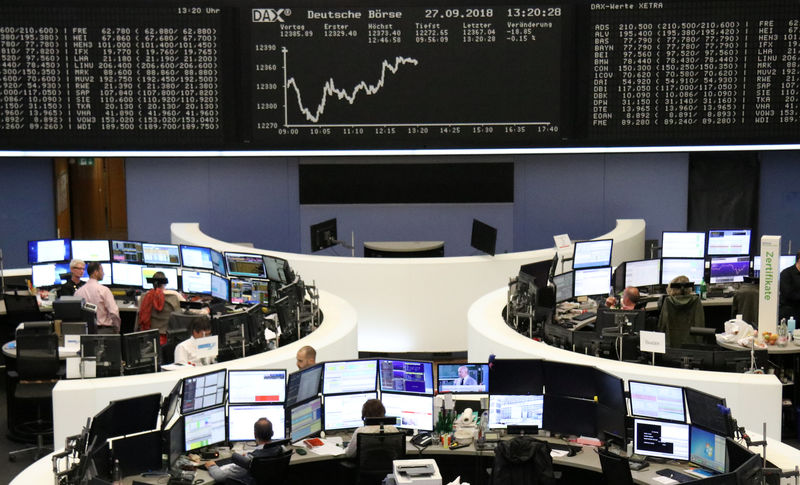By Danilo Masoni and Helen Reid
MILAN/LONDON (Reuters) - European shares slid on Friday after the Italian government agreed to set a higher than expected budget deficit target that could put Rome on a collision course with Brussels.
Shares in Italian banks (FTIT8300), whose big sovereign bond portfolios makes them sensitive to political risk, bore the brunt of selling pressure, sinking 7.3 percent as government bonds sold off and the focus turned to rating agencies.
Along with the main Italian stock index (FTMIB), the banks had their worst day since the June 2016 Brexit vote triggered a selloff across markets.
The pan-European STOXX 600 (STOXX) index slid 0.8 percent with the leading euro zone stocks index (STOXX50E) down 1.3 percent.
As the quarter drew to a close, the pan-European index managed a modest gain - its second quarter in the black. But the fact the three months resulted in just a 1 percent rise reflects the turmoil the region has gone through in that time.
Italy's FTSE MIB (FTMIB) index fell 3.7 percent, while Germany's DAX (GDAXI) fell 1.4 percent.
"The deficit number is higher than expected and that clearly is not a good sign. All the attention will now shift to ratings agencies which were waiting for the budget to reconsider their scorings," said Gilles Guibout, portfolio manager at AXA IM in Paris.
"Meanwhile, it's difficult to imagine that Italian stocks will perform well," he added.
Italy's government on Thursday targeted the budget deficit at 2.4 percent of gross domestic product for the next three years, defying Brussels and marking a victory for party chiefs over economy minister Giovanni Tria, an unaffiliated technocrat.
Financials weighed heavily on the STOXX 600, dragged down by losses among Italian banks. The euro zone banks index (SX7E) fell 3.9 percent, its worst day in four months.
Analysts at Credit Suisse (SIX:CSGN) led by Carlo Tommaselli said Italy's deficit target at 2.4 percent of GDP was not the worst-case scenario for markets but still posed some issues.
"The key point is that the higher than expected deficit is addressed to finance new expenses rather than growth," they wrote in a note, adding that action from rating agencies was now critical for the country's banks.
"A potential downgrade of the country rating could pose risks to the sovereign investment grade and additional potential charges to CET1 ratios which nevertheless would be mitigated by the internal models which most of the Italian banks adopt," they added.
Shares in Italy's two largest banks, Intesa Sanpaolo (MI:ISP) and UniCredit (MI:CRDI), fell 8.4 and 6.7 percent, while smaller lenders such as Banco BPM (MI:BAMI) and UBI (MI:UBI) were also under heavy selling pressure.
Postal group Poste Italiane (MI:PST), which holds 130 billion euros of Italian government bonds, fell 4.3 percent.
The EU adopted a non-confrontational stance toward Italy after the budget plan was released.
Elsewhere, BASF (DE:BASFn) fell 2.3 percent after the chemicals group agreed to combine its oil and gas businesses Wintershall with DEA to create an independent European oil and gas company. BASF also said demand was slower than initially expected in the third quarter.
RSA Insurance (L:RSA) reported a small rise in net written premiums for the year so far, but said higher weather losses in Britain led to a disappointing third quarter. Its shares fell 9.3 percent.
Losses on the broader European market were limited by gains among some defensive healthcare and consumer stocks.
Swedish aerospace company Saab (ST:SAABb) rallied 8.2 percent boosted by news its partner Boeing (NYSE:BA) had won a $9.2 billion contract with the U.S. Air Force.

And Telefonica (MC:TEF) Deutschland (DE:O2Dn) shares jumped 3.6 percent after Morgan Stanley (NYSE:MS) analysts upgraded the stock to "overweight", predicting top-line growth would turn positive for the first time in the third quarter.